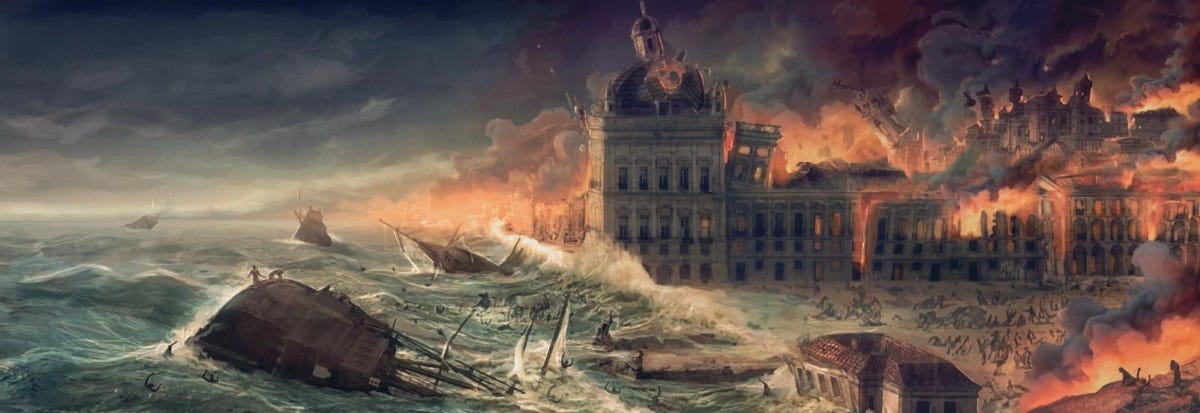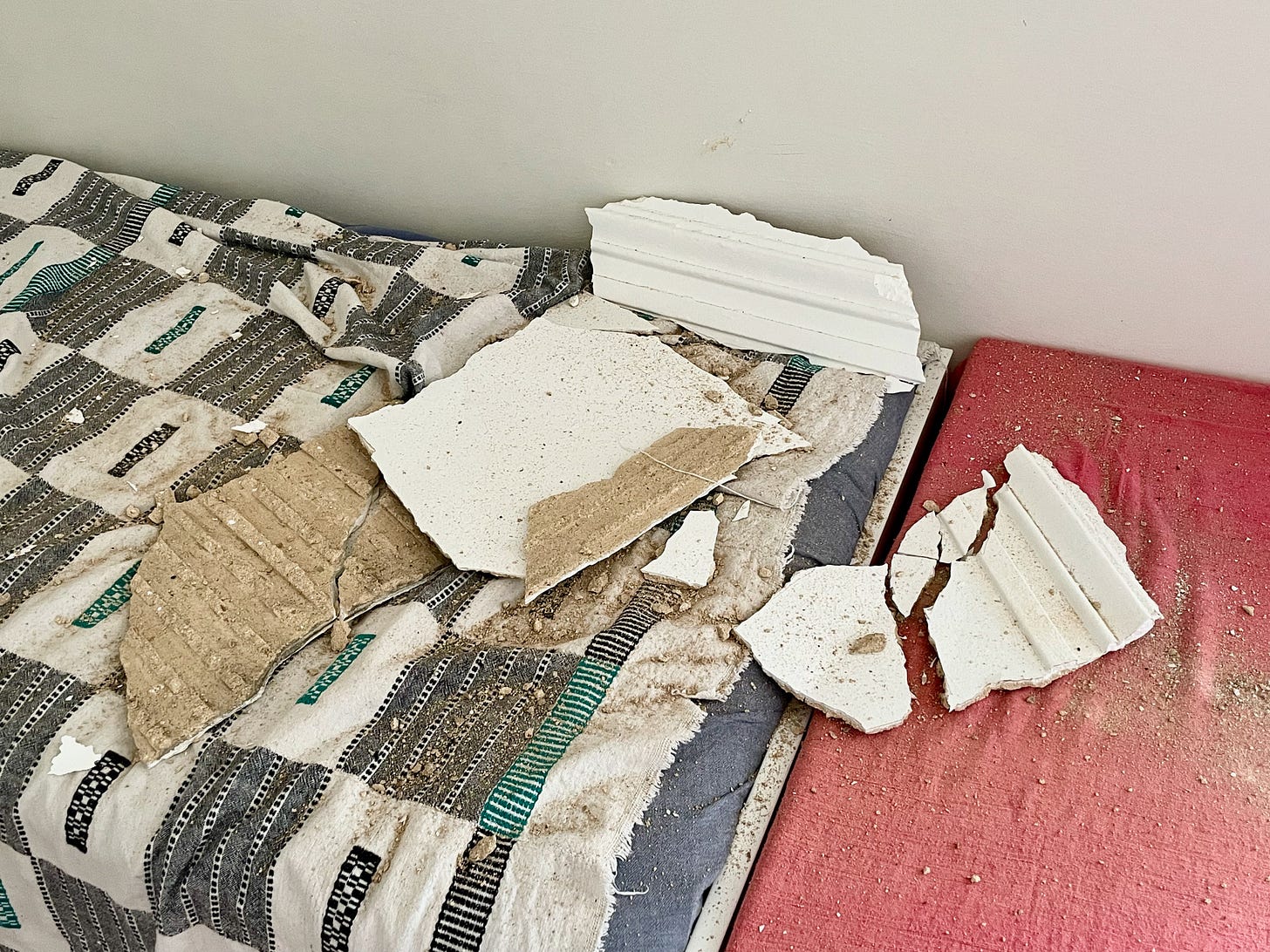I firmly believe that nobody, except possibly bakers and ambulance drivers, should be awake at five o’clock in the morning. Nevertheless, one recent Monday morning, there I was, sitting in bed and reading. I had slept poorly, and by about four-thirty, had decided I needed to do something other than fail to sleep. I was alone in the bed, because Liza had taken to sleeping in the other room since our relationship started to collapse. So it was easy for me to simply prop myself up with some pillows and pick up a book. If drowsiness was the objective, it was probably a poor choice to read a mystery thriller about a serial killer, and in Italian at that—a language I don’t speak all that well, thus requiring more concentration—but that is what I had on hand, and so that is what I was reading at exactly 5:11 AM.
At that minute, the upstairs neighbors started to run around. I heard the ceiling creaking, and thought, “What could they be doing at this hour?” Then the creaking started getting louder, and there were thumping sounds against the wall. I thought, “Wait, could they be having sex at this hour?” And then the shutters started to rattle, and the head of my bed started to clatter against the wall. We frequently have very strong winds here in Lisbon, so I thought, “Could it be a storm?” But gale-force winds don’t just come out of nowhere, and they don’t shake the bed. Then I heard a rumbling sound from below, getting louder and louder, and noticed that the walls were all shaking. And I thought, “Oh, right: earthquake!”
Portugal is an area of such seismic intensity that the tremor map has more dots than a teenager has pimples. But most of them are very small, and not perceptible to humans. There hadn’t been a decent-sized earthquake in Lisbon for years, but all long-term residents of the city have, deep in the basement of their mind, the little pilot light of awareness that in 1755, the city was nearly demolished by one of the largest earthquakes ever to hit Europe.
I leapt out of bed and ran into the hallway, where I nearly collided with Liza. We looked at each other and shouted, “Earthquake!”, which pretty much exhausted our preparedness. She said, “What should we should do?” I said, “I don’t know, maybe stand in the doorway?” She pointed at my penis and said, “Pants!” Surprised, but willing to obey, I returned to the bedroom and slipped on underpants, shorts and a t-shirt. Now I could die with propriety. I rejoined her in the doorway. She was very scantily clad but was now wearing her purse. Clearly, she thought we might make a run for it, and yet we didn’t. We just stood there, with the dishes rattling in the cupboards and the bottles clinking in the liquor cabinet, intensely not knowing what to do.
And then a strange thing happened. I was pervaded by a sense of calm—the sort of calm that is born of the realization that what you do now doesn’t really matter. Like the feeling I get when I am walking to meet someone, quickly because I am late, and wondering whether I will get there before them, and turn the final corner to see that nobody is on the verge of arriving, so either I’m late or I’m fine, but there’s no changing the outcome. Now, we were on the fourth floor of a building in an earthquake, and either it would all come down around us or everything would be OK. There was too much building above us and below us for us to have any chance of survival if it was going to collapse. But there had been earthquakes in Lisbon before and, at least for the past quarter-millennium, most people had survived them. I knew that it was not up to me to decide the outcome of the situation, and that thought was strangely soothing.
The tremor subsided after about a minute. The noise died down, the shaking stopped, the clinking tapered off, and the creaking eased. Cautiously, we went to the window and looked out onto the street, but everything looked strangely normal—almost bizarrely normal. We heard no sirens or other sounds suggesting distress. This prompted in me a realization about the Portuguese: They tend to get hysterical about little things, but stay calm about big things. We had recently celebrated the fiftieth anniversary of the revolution that ended the dictatorship and had fewer casualties than many European football games.
I got out my phone and saw that Google was telling me there had been an earthquake (thanks, Google) but was unable to get through to the Portuguese meteorological website. I figured that was more likely due to an overload of traffic to the site than to the collapse of Western Civilization.
So I stripped off my clothes and went back to bed. Liza asked sheepishly if she could come and sleep with me. We snuggled down and lay in the bed, while visions of aftershocks danced in our heads. But the early morning was quiet, strangely quiet. Lying there with Liza, I felt my heart rate go down, felt vigilance melt away, and felt grogginess return. We were shaken, but we no longer stirred.
One week later, the ceiling collapsed. Not the whole ceiling, but a nice big chunk of it, right over Liza’s bed. As fate would have it, she was not in the bed at the time, and so escaped harm.
What to say about that? I would love to be able to say that she was saved from a plastery death because she was nestling in my arms in the other bedroom, all our troubles forgotten. But in fact, the debris missed her by about twelve thousand kilometers, as she had escaped to Bali. She was spending a month there—visiting friends, doing yoga, and drinking coconut water—while I looked for a new apartment back in Lisbon. By the time she got back, I should be all packed and ready to go. Assuming that the house survived that long.
One day, during her stay, there was an earthquake in Bali. Liza phoned me to tell me about it. It was less intense than the one in Lisbon, but she was still spooked. Apparently the locals noticed it but paid little attention. It seems the Balinese and the Portuguese have something in common.
I thought about that. Sometimes things just happen—earthquakes, breakups—that leave you shaken but still intact. With experience, you just learn to live through them and carry on. Preferably wearing pants.









Glad that your earthquake was not "the big one." In my time here in Japan I've experienced quite a few quakes, but I've been fortunate not to have been close to the epicenter of any especially large ones. For me the scary part is when the shaking reaches a moderate level, and you don't know yet whether it's reached its peak, or whether it's about to get much, much worse. Maybe life's metaphorical quakes are like that too.